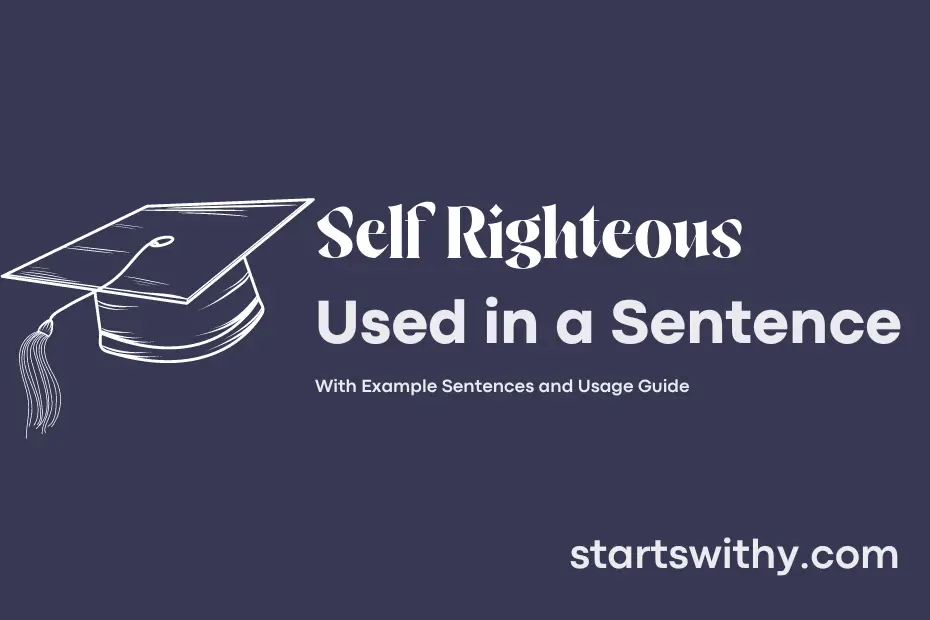Have you ever encountered someone who is self-righteous? A person exhibiting self-righteous behavior believes they are morally superior to others, often coming across as judgmental and condescending. This attitude stems from an unwavering belief in their own righteousness, leading them to look down upon those they perceive as less virtuous.
Self-righteous individuals may display an air of superiority, thinking they have a monopoly on the truth and ethical values. Their lack of humility can make interactions frustrating and contentious, as they may preach their beliefs while dismissing differing perspectives.
7 Examples Of Self Righteous Used In a Sentence For Kids
- My friend always acts self righteous and thinks he knows everything.
- It’s not nice to be self righteous and make others feel bad.
- Remember to share and help others, instead of being self righteous.
- Let’s be kind to everyone and not be self righteous like the fox in the story.
- True friends listen to each other and don’t act self righteous.
- Being self righteous means believing you are always right, which is not nice.
- We should be humble and not self righteous when we make mistakes.
14 Sentences with Self Righteous Examples
- Many college students tend to come across self righteous individuals in debate clubs.
- Priya always gets irritated by her roommate’s self righteous attitude when discussing social issues.
- Some students display a self righteous demeanor when showcasing their academic achievements.
- The professor’s self righteous behavior towards students who asked questions made the classroom environment tense.
- It can be challenging to work on group projects when one member is self righteous and unwilling to compromise.
- In campus politics, there are often clashes between different groups, each believing they are more self righteous than the other.
- During class discussions, Rohan tends to come off as self righteous when sharing his opinions on controversial topics.
- The seniors’ self righteous behavior can intimidate juniors, making it hard for them to seek guidance or support.
- Ritu’s self righteous stance on environmental issues often sparks heated debates with her peers.
- Students often witness self righteous behavior from upperclassmen during cultural events and competitions.
- Some professors have a reputation for being self righteous, making it difficult for students to approach them for help outside of class.
- The student council president’s self righteous attitude towards the opposition led to a deadlock in decision-making processes.
- The leader of the college’s social activism club is known for her self righteous approach to implementing change on campus.
- In group study sessions, it’s important to maintain open communication and avoid coming across as self righteous when sharing ideas.
How To Use Self Righteous in Sentences?
Self Righteous is used to describe someone who is convinced of their own righteousness and is intolerant of the opinions and behavior of others. You can use Self Righteous in a sentence to convey judgment or criticism towards someone who acts in a morally superior manner. For example, “She always acts so self-righteous when discussing her beliefs, making it difficult to have a productive conversation.”
To use Self Righteous effectively, consider the context in which you are using it. It is often used to highlight a sense of moral superiority, arrogance, or judgmental behavior. Remember that this term carries a negative connotation and should be used carefully to avoid offending or alienating others.
When incorporating Self Righteous into your sentence, ensure that it accurately conveys the attitude or behavior you are trying to describe. Be mindful of the tone of your sentence and use Self Righteous appropriately to maintain clarity and effectiveness in your communication.
In summary, to use Self Righteous in a sentence for beginners, remember to consider its meaning and connotation, use it to describe someone who displays an attitude of moral superiority, and employ it thoughtfully to effectively convey your message.
Conclusion
In conclusion, self-righteous sentences are characterized by a tone of moral superiority or smugness. They often express a sense of being morally or intellectually superior to others, leading to a lack of empathy or understanding. These types of sentences can come across as judgmental and condescending, causing tension or conflict in communication.
It is important to be mindful of the language we use and the tone we adopt in our sentences. By being aware of the tendencies towards self-righteousness in our communication, we can strive to cultivate a more open and respectful dialogue with others, fostering understanding and collaboration rather than division and animosity.



